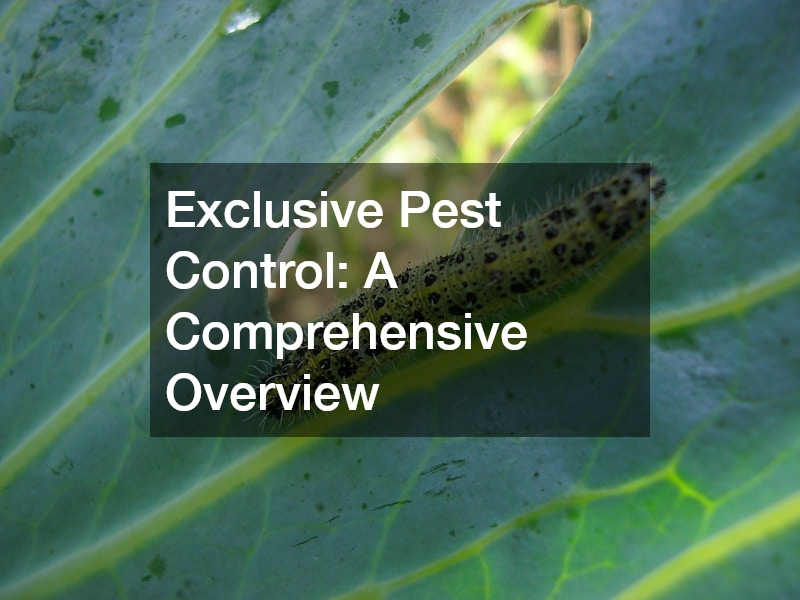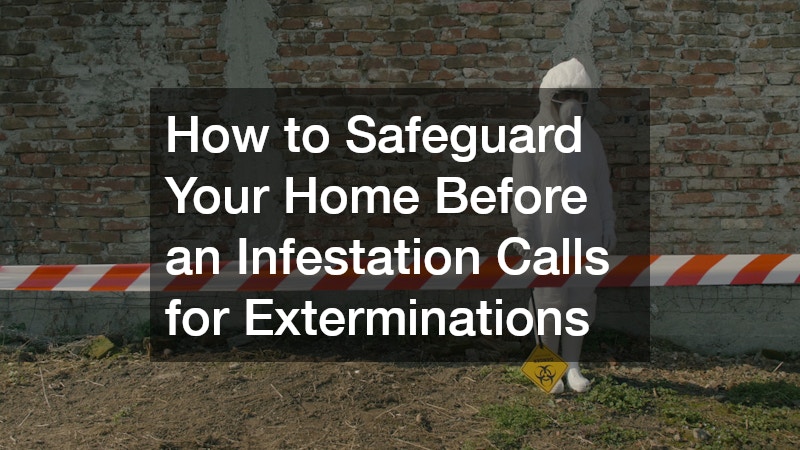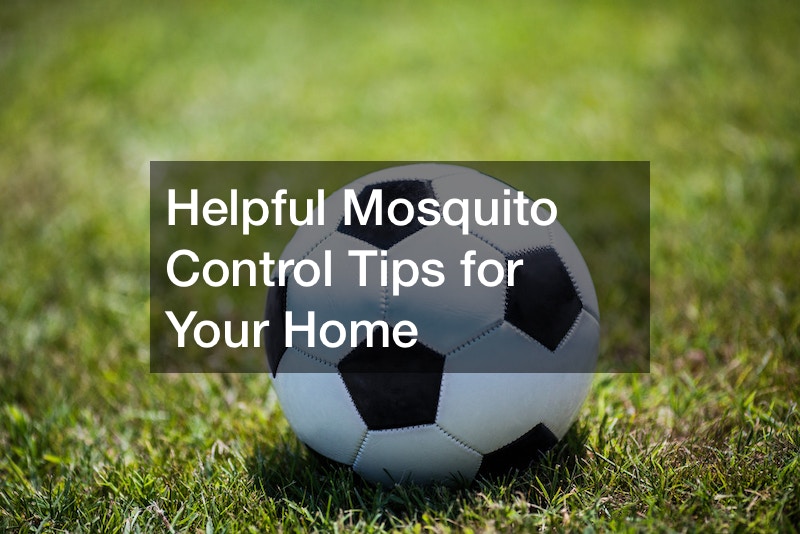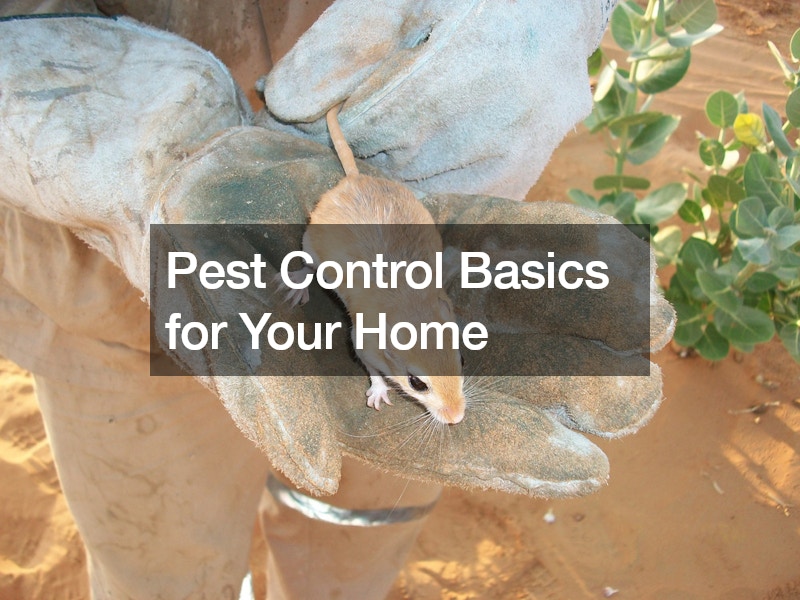Pest Control 101
Exclusive pest control is a vital aspect of home and property maintenance, offering specialized solutions to ensure that unwanted pests are kept at bay. While traditional pest control methods may focus solely on eradication, exclusive pest control goes beyond that by integrating preventive measures, environmental consciousness, and long-term solutions tailored to individual needs. Whether dealing with insects, rodents, or other unwelcome invaders, the goal is not just to eliminate pests but to create a healthier, safer living environment. Homeowners and property managers alike can benefit from a more comprehensive approach that addresses both the current pest issues and the root causes that attract these nuisances in the first place.

Understanding Exclusive Pest Control Methods
Pest control methods have evolved significantly over the years, from basic extermination to more exclusive approaches that emphasize prevention and long-term management. Modern exclusive pest control methods integrate a variety of techniques, including the use of environmentally friendly pesticides, biological control agents, and innovative monitoring tools. The goal is to create a holistic pest control system that not only removes pests but also prevents them from returning. This comprehensive approach benefits both the environment and human health, as it reduces the need for repeated chemical treatments and minimizes the risk of harmful exposures.
Specifically, exclusive pest control services provide tailored solutions based on the type of pests and the unique conditions of each property. A professional pest control service might begin with a detailed assessment of the home, identifying potential entry points and areas where pests are likely to thrive. From there, they will develop a customized plan that might include sealing off entry points, setting traps, and using targeted treatments to eliminate pests. By focusing on prevention and long-term control, these services help ensure that the property remains protected against future infestations.
Identifying Common Household Pests
Household pests are more than just a nuisance; they can also pose serious health risks and cause significant property damage. Common pests like ants, roaches, rodents, and termites are often drawn to areas where food, water, and shelter are readily available. Identifying these pests early is critical to preventing an infestation from spreading. Exclusive pest control methods help by offering advanced detection tools that allow homeowners to spot pest activity before it becomes a major problem. These methods often include regular inspections, monitoring systems, and the use of non-toxic deterrents to keep pests at bay.
In addition to using exclusive pest control methods to manage pests, homeowners can also benefit from complementary services like soft washing. Soft washing is a cleaning method that uses low-pressure water combined with specialized cleaning solutions to remove mold, mildew, and other organic materials from surfaces like roofs and siding. By keeping the exterior of the home clean, homeowners can reduce the chances of pests finding a welcoming environment. For example, soft washing can help eliminate mold and moisture that might attract insects or rodents, making it an essential part of a comprehensive pest control strategy.

Evaluating the Benefits of Preventive Measures
Preventive measures are a crucial aspect of exclusive pest control, focusing on stopping infestations before they start. Instead of simply reacting to the presence of pests, preventive strategies aim to reduce the factors that attract them. This proactive approach can include regular inspections, sealing cracks and crevices, and maintaining cleanliness both inside and outside the home. Preventive measures also emphasize habitat modification—altering the environment in a way that makes it less inviting for pests. For example, trimming vegetation, removing standing water, and keeping food stored securely can all reduce the likelihood of pests taking up residence in your home.
A roofing company can play a vital role in preventive pest control by ensuring that the roof is well-maintained and free of vulnerabilities. Roof damage, such as loose shingles or gaps around vents, can create easy entry points for pests like rodents, bats, or insects. Working with a roofing company as part of an exclusive pest control strategy allows homeowners to identify and repair these issues before they become larger problems. By keeping the roof in good condition, homeowners not only protect their property from the elements but also from unwanted invaders.
Exploring Integrated Pest Management Strategies
Integrated Pest Management (IPM) is an effective and environmentally responsible approach to exclusive pest control. IPM combines various techniques such as biological control, habitat modification, and the careful use of pesticides to create a sustainable pest control plan. Rather than relying solely on chemical treatments, IPM emphasizes understanding the behavior and biology of pests to manage them effectively. This method prioritizes long-term prevention and minimizes harm to the environment, making it a preferred choice for both homeowners and pest control professionals. By using a combination of tactics, IPM can reduce pest populations to manageable levels while preserving the ecological balance.
An often-overlooked aspect of Integrated Pest Management is proper garbage removal. Improperly stored or overflowing garbage can attract pests like rodents, insects, and raccoons, leading to infestations. As part of an exclusive pest control plan, timely and efficient garbage removal is essential to prevent pests from accessing food sources and shelter.

Implementing Safe Pest Control Practices
When it comes to exclusive pest control, safety is a top priority for both homeowners and the environment. Safe pest control practices involve the careful selection and application of treatments that minimize risks to humans, pets, and non-target organisms. This might include using non-toxic repellents, natural predators of pests, or low-impact chemical options when necessary. Additionally, safe practices ensure that treatments are applied in a way that reduces contamination of soil, water, and air. By following industry standards and regulations, exclusive pest control professionals can protect both the property and the people who live there while still effectively managing pest populations.
Tree removal companies can be an essential part of safe pest control practices. Trees that are dead, dying, or overgrown can provide ideal habitats for pests like termites, ants, or rodents. These pests can then spread from the trees to the home, causing significant damage. A tree removal company can help eliminate these potential pest habitats, reducing the risk of infestations. By working with a tree removal company as part of an exclusive pest control strategy, homeowners can ensure that their property remains both pest-free and safe from the structural dangers posed by unhealthy trees.
Assessing the Role of Professional Pest Control
Professional pest control services play a crucial role in managing pest infestations, especially when they are severe or recurring. While homeowners can take steps to prevent pests, there are situations where a trained expert is necessary to handle more complex problems. Professional pest control technicians bring years of experience, specialized equipment, and a deeper understanding of pest behavior, allowing them to address the issue at its root. They can also offer exclusive pest control services that are tailored to the specific needs of the property, ensuring a more thorough and lasting solution. By using a combination of treatments, professionals can tackle even the most persistent infestations while minimizing disruption to the household.
A local arborist can also contribute significantly to exclusive pest control efforts, especially when it comes to managing pests that affect trees and other vegetation. Trees can harbor insects like aphids, beetles, or caterpillars that may spread to the home or damage the surrounding landscape. A local arborist can assess the health of trees, recommend treatments to eliminate pests, and provide ongoing care to prevent future infestations.

Monitoring the Effectiveness of Pest Control Solutions
Monitoring is an essential part of exclusive pest control, as it allows homeowners and professionals to assess the effectiveness of the pest control methods being used. Regular monitoring helps identify any ongoing pest activity and ensures that treatments are working as intended. This process might involve the use of traps, visual inspections, or the placement of sensors that detect pest movement. Monitoring also enables adjustments to be made if pests are not responding to the current strategy, allowing for more targeted treatments. By staying vigilant, homeowners can maintain control over pest populations and prevent future infestations.
Custom lighting solutions can enhance the monitoring and effectiveness of pest control measures. Outdoor lighting, in particular, can deter nocturnal pests such as rodents, insects, and even larger wildlife by making the environment less appealing. Additionally, custom lighting can highlight problem areas, making it easier to spot signs of pest activity during nighttime inspections.
Addressing Seasonal Pest Control Challenges
Seasonal changes often bring new pest control challenges as different pests become more active during specific times of the year. For example, during warmer months, insects like mosquitoes, ants, and flies tend to proliferate, while colder weather can drive rodents indoors to seek warmth. Exclusive pest control strategies take these seasonal variations into account by offering customized treatments that target the pests most likely to invade at particular times of the year. Addressing these seasonal challenges requires a proactive approach, with homeowners and pest control professionals working together to ensure that treatments are applied at the right times to maximize effectiveness.
Contracting professionals for specific seasonal pest control tasks can help homeowners stay ahead of these challenges. For instance, during the spring and summer, contracting services for pest-proofing outdoor areas like patios and decks can be beneficial. In the fall and winter, contracting pest control services for sealing cracks, installing door sweeps, or treating areas where pests seek shelter can reduce the risk of infestation.
Managing Long-Term Pest Prevention Techniques
Long-term pest prevention is the cornerstone of exclusive pest control, focusing on sustainable solutions that protect homes and properties from recurring infestations. Unlike short-term treatments that may only address the immediate issue, long-term prevention involves creating an environment that is consistently inhospitable to pests. This might include regular inspections, ongoing maintenance of exclusion barriers, and habitat modification to reduce attractants. The goal is to ensure that pests do not have the opportunity to settle in or around the home, offering homeowners peace of mind and reducing the need for repeated treatments.
One way to support long-term pest prevention is by working with a deck builder to ensure that outdoor spaces are constructed in a way that minimizes the risk of pest intrusion. For example, using materials that are resistant to termites and other wood-destroying insects, sealing gaps between decking boards, and creating proper drainage systems can all contribute to a pest-free environment. A well-designed and maintained deck not only enhances the beauty of the property but also reduces the chances of pests finding a suitable habitat.
Reviewing Environmental Considerations in Pest Control
Environmental considerations are becoming increasingly important in the world of exclusive pest control. More homeowners are seeking methods that not only protect their property from pests but also minimize harm to the surrounding ecosystem. This includes choosing eco-friendly products, reducing the use of chemical pesticides, and implementing natural control methods such as biological agents or habitat alteration. Exclusive pest control methods are often designed to balance the needs of homeowners with the importance of preserving environmental health, making sure that pest control solutions are both effective and sustainable.
A local landscaper can play a key role in integrating environmental considerations into a pest control plan. By designing and maintaining a landscape that naturally deters pests—such as planting pest-repellent vegetation or improving soil health—landscapers can reduce the need for chemical treatments. Additionally, proper landscaping techniques like mulching, watering, and pruning can help prevent conditions that attract pests in the first place.
Utilizing Pest Control Strategies
Exclusive pest control offers a comprehensive approach to managing and preventing pest infestations in homes and properties. By going beyond simple eradication, these methods emphasize long-term prevention, environmental responsibility, and customized solutions tailored to the unique needs of each property. Whether through the use of advanced technologies, professional expertise, or the integration of complementary services such as roofing, landscaping, and tree removal, exclusive pest control ensures that homes are protected from pests sustainably and effectively. The collaboration of various professionals—including pest control technicians, arborists, contractors, and landscapers—can create a unified strategy that not only addresses current pest issues but also prevents future ones from occurring.



